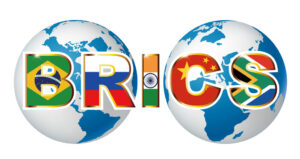The Real Message from the BRICS Summit
BRICS, 2 Oct 2023
Prince Michael of Liechtenstein | BRICS Info Portal - TRANSCEND Media Service
28 Sep 2023 – Between August 22 and 25, the BRICS – a loose association of Brazil, Russia, India, China and South Africa – held a summit in Johannesburg that made plenty of waves. Aside from the five main countries, some 30 other developing nations were invited to participate.
“BRICS is a diverse group of nations,” said President Cyril Ramaphosa of South Africa, the host. “It is an equal partnership of countries that have differing views but a shared vision for a better world.” It is an apt description, especially when it comes to the mentioned “differing views.”
The group’s pivotal defining factor lay in the countries’ shared aspiration to distance themselves from an American- and European-led “rule-based world order,” as well as the dominance of the U.S. dollar within the global monetary system. They are especially concerned about the dominance of the dollar being used to enforce sanctions.
Challenging the West
China and Russia aim to leverage BRICS within the framework of a larger systemic conflict with Western powers. This approach is unlikely to resonate with many nations of the Global South, which seek to assert their own perspectives. Often, they view Western value policies as emblematic of paternalistic control, arrogance and a thinly veiled guise for protectionism. They frequently invoke the term “neocolonialism.”
In a somewhat simplistic manner, though not entirely inaccurate, BRICS is often perceived as a counterpoint to the G7, which consists of the top seven industrialized democracies, along with the European Union.
In view of all this, a notable proposal was put on the table, spearheaded by Brazil: the establishment of a BRICS currency. China and Russia regard this as a top priority, given the current and potential sanctions mechanisms. Nevertheless, Beijing’s preference leans toward making the renminbi a global reserve currency rather than serving as a shared BRICS currency. This emerged as the central theme of the summit, in addition to the issue of enlargement.
The primary, albeit unspoken, “differing view” is this: Neither India, nor Brazil, nor South Africa intend to replace a perceived Western hegemony with that of China, which is rooted in its economic might and influence within institutions like the Asian Infrastructure Investment Bank, BRICS Bank, the Shanghai Cooperation Organisation, and others. This sentiment extends to certain United Nations bodies, including the World Health Organization (WHO).
African potential
The summit’s most notable outcome was the admission of six new members. Among these, Iran stands out as particularly contentious and in direct opposition to the U.S. Saudi Arabia and the United Arab Emirates will bring substantial financial resources, while Argentina will bolster South American representation. Egypt and Ethiopia will enhance the African presence within the organization.
The African position in particular is experiencing newfound strength. Historically, Africa was often viewed more as a geopolitical subject rather than an active participant. This is now changing. Beyond its mineral wealth, Africa holds two of the most crucial assets: a youthful populace and arable land for food production. By 2060, Africa could account for around 30 percent of the global population. Meanwhile, according to the UN’s Food and Agriculture Organization, Africa possesses 45 percent of the world’s cultivable land for agriculture and 60 percent of untapped arable land. With this immense potential, African nations are gaining the confidence to assertively claim their role in the global arena.
Evolving global realities
Political analysts often draw parallels between these developments and the nonaligned movement during the Cold War, which included nations like India, Yugoslavia and Egypt. While there are certain similarities, it is crucial to note that the underlying dynamics have evolved significantly.
During the Cold War, in the early 1980s, the G7 (effectively symbolizing the Western bloc) held a gross domestic product (GDP) accounting for about 46 percent of the global total. In contrast, the combined economies of the five BRICS nations represented 16 percent in terms of purchasing power parity (PPP). This landscape has experienced substantial transformation. By 2022, the five BRICS countries accounted for 32 percent of global GDP, while the G7 constituted 30 percent. With the inclusion of the new members, the BRICS (or its future iteration) will extend its lead in terms of PPP. Nevertheless, the G7 retains a distinct advantage in terms of GDP per capita.
The collective population of the BRICS 11 now stands at 3.5 billion people, accounting for approximately 40 percent of the global population, in contrast to the 775 million residents in the G7 nations.
The current significance of this summit might be somewhat limited due to President Ramaphosa’s acknowledgment of “differing views,” which indicates that immediate outcomes or effects might not be forthcoming. Furthermore, challenging the established dominance of the dollar within the global monetary system is unlikely to occur in the short term. The value of currency hinges on trust and liquidity, and despite the dollar being employed by Washington for political purposes and as a weapon, it retains its status as the most liquid currency, backed by a measure of trust.
It is important to note that over the past two decades, economic growth in the U.S., measured by PPP, has surpassed that of the BRICS countries, with the notable exception of China.
Larger trend
The true significance of the recent BRICS summit lies in recognizing it as a symptom of a broader trend that questions the established American-European global order. Western value-based strategies are often perceived, with justifiable rationale, as a hypocritical means to uphold the West’s dominance and protect its markets. Within the Western narrative of a systemic conflict between (righteous) democracies and (malevolent) authoritarians, particularly Russia and China, this perception of hypocrisy benefits Moscow and especially Beijing.
Viewing the Global South through the lens of a conflict between democracy and authoritarianism is a distorted perspective. Attempting to coerce emerging nations into picking sides will not only prove ineffective, but also counterproductive.
The results of the summit serve as an appeal to Western capitals to acknowledge the gravity of the situation and formulate practical policies that benefit the emerging world by prioritizing opening markets over coercing them into unfamiliar rules and systems. As we enter a multipolar era, it becomes imperative to acknowledge new players and the reality that the global landscape will not be characterized by harmonized systems, but rather a rich variety of approaches.
_______________________________________________
Source: gisreportsonline.com
 Prince Michael of Liechtenstein graduated from the Vienna University of Economics and Business with a master’s degree in business administration. During his studies, he worked with banks and manufacturing companies in Canada, the United States and Belgium. From 1978 to 1987 he worked for Nestlé SA in the fields of controlling, marketing and management in various markets throughout Europe and Africa. In 1987 he returned to Liechtenstein where he took over the position of Managing Director with Industrie- und Finanzkontor Ets., a leading trust company with tradition and expertise in long-term, multi-generational preservation of wealth, family values and businesses. Today, Prince Michael of Liechtenstein is the company’s executive chairman.
Prince Michael of Liechtenstein graduated from the Vienna University of Economics and Business with a master’s degree in business administration. During his studies, he worked with banks and manufacturing companies in Canada, the United States and Belgium. From 1978 to 1987 he worked for Nestlé SA in the fields of controlling, marketing and management in various markets throughout Europe and Africa. In 1987 he returned to Liechtenstein where he took over the position of Managing Director with Industrie- und Finanzkontor Ets., a leading trust company with tradition and expertise in long-term, multi-generational preservation of wealth, family values and businesses. Today, Prince Michael of Liechtenstein is the company’s executive chairman.
Go to Original – infobrics.org
Tags: BRICS
DISCLAIMER: The statements, views and opinions expressed in pieces republished here are solely those of the authors and do not necessarily represent those of TMS. In accordance with title 17 U.S.C. section 107, this material is distributed without profit to those who have expressed a prior interest in receiving the included information for research and educational purposes. TMS has no affiliation whatsoever with the originator of this article nor is TMS endorsed or sponsored by the originator. “GO TO ORIGINAL” links are provided as a convenience to our readers and allow for verification of authenticity. However, as originating pages are often updated by their originating host sites, the versions posted may not match the versions our readers view when clicking the “GO TO ORIGINAL” links. This site contains copyrighted material the use of which has not always been specifically authorized by the copyright owner. We are making such material available in our efforts to advance understanding of environmental, political, human rights, economic, democracy, scientific, and social justice issues, etc. We believe this constitutes a ‘fair use’ of any such copyrighted material as provided for in section 107 of the US Copyright Law. In accordance with Title 17 U.S.C. Section 107, the material on this site is distributed without profit to those who have expressed a prior interest in receiving the included information for research and educational purposes. For more information go to: http://www.law.cornell.edu/uscode/17/107.shtml. If you wish to use copyrighted material from this site for purposes of your own that go beyond ‘fair use’, you must obtain permission from the copyright owner.

Well, no surprise from this prince! Of course the only way is hegemonic and since we ( G7 and friends) have done such a good job for world peace, harmony, equality we should be allowed to continue, and anyone else obviously would only do the same. BRI, peace, security, sharing is all pretence by China!!!!!!